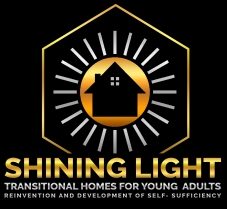
Make a difference today! Donate to Shining Light Transitional Homes and help young adults build a stable, independent future.
Join us in transforming lives! Partner with Shining Light Transitional Homes to support at-risk young adults on their path to independence.















Our case managers work with participants to identify their individual needs and goals, create an individualized service plan, and connect them with the appropriate resources to achieve their goals.
We provide psychiatric rehabilitation services to help participants improve their functional skills, achieve their goals, and increase their independence and community integration.
We offer community-based support services to help participants increase their engagement in community-based services and build a reliable support system.
Our life skills training curriculum provides participants with the necessary skills to achieve self-sufficiency, including financial literacy, time management, job readiness, and communication skills.
We provide spiritual and emotional support through counseling and pastoral care to help participants build resilience, cope with life’s challenges, and develop a positive outlook on life.


Supporting Shining Light Transitional Homes has been one of the most rewarding decisions I've made. Knowing that my contributions help young adults secure stable housing, gain life skills, and find hope for the future fills me with pride. This organization is truly changing lives.

I believe in giving back to the community, and Shining Light Transitional Homes is doing incredible work. Their commitment to helping young adults transition to independence is inspiring. Seeing the real impact of my donations motivates me to continue supporting their mission.

Investing in the future of our youth is crucial, and Shining Light Transitional Homes provides the foundation they need to succeed. Every dollar donated goes towards life-changing programs that give these young adults a second chance. I’m honored to be part of this journey.